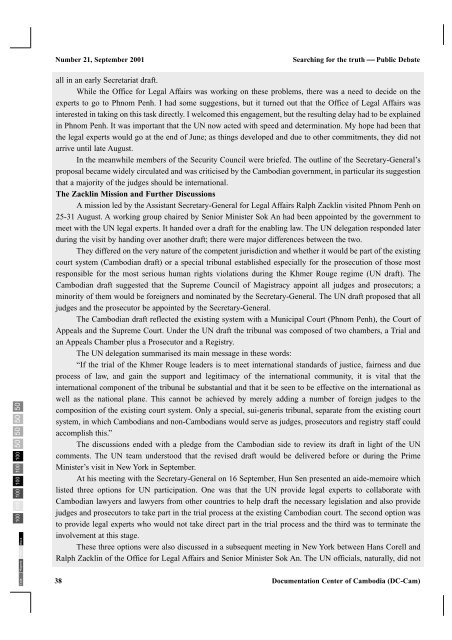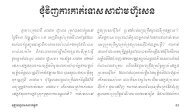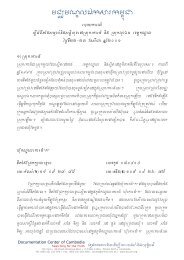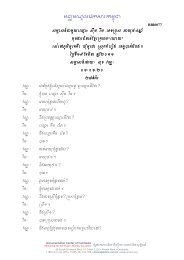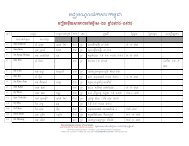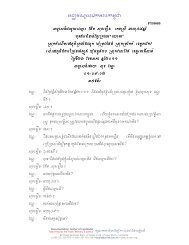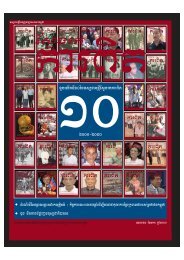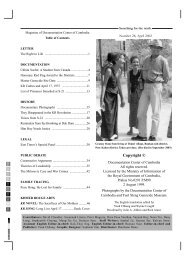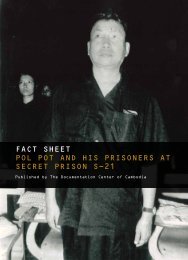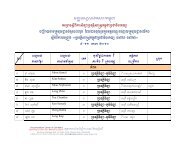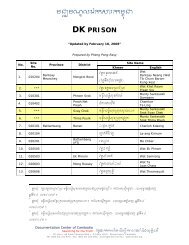Searching for the truth Issues 21 - Documentation Center of Cambodia
Searching for the truth Issues 21 - Documentation Center of Cambodia
Searching for the truth Issues 21 - Documentation Center of Cambodia
You also want an ePaper? Increase the reach of your titles
YUMPU automatically turns print PDFs into web optimized ePapers that Google loves.
100 100 100 100 100 100 50 50 50 50<br />
Black<br />
Yellow<br />
Magenta<br />
Cyan<br />
Number <strong>21</strong>, September 2001<br />
38<br />
<strong>Searching</strong> <strong>for</strong> <strong>the</strong> <strong>truth</strong> ⎯ Public Debate<br />
all in an early Secretariat draft.<br />
While <strong>the</strong> Office <strong>for</strong> Legal Affairs was working on <strong>the</strong>se problems, <strong>the</strong>re was a need to decide on <strong>the</strong><br />
experts to go to Phnom Penh. I had some suggestions, but it turned out that <strong>the</strong> Office <strong>of</strong> Legal Affairs was<br />
interested in taking on this task directly. I welcomed this engagement, but <strong>the</strong> resulting delay had to be explained<br />
in Phnom Penh. It was important that <strong>the</strong> UN now acted with speed and determination. My hope had been that<br />
<strong>the</strong> legal experts would go at <strong>the</strong> end <strong>of</strong> June; as things developed and due to o<strong>the</strong>r commitments, <strong>the</strong>y did not<br />
arrive until late August.<br />
In <strong>the</strong> meanwhile members <strong>of</strong> <strong>the</strong> Security Council were briefed. The outline <strong>of</strong> <strong>the</strong> Secretary-General’s<br />
proposal became widely circulated and was criticised by <strong>the</strong> <strong>Cambodia</strong>n government, in particular its suggestion<br />
that a majority <strong>of</strong> <strong>the</strong> judges should be international.<br />
The Zacklin Mission and Fur<strong>the</strong>r Discussions<br />
A mission led by <strong>the</strong> Assistant Secretary-General <strong>for</strong> Legal Affairs Ralph Zacklin visited Phnom Penh on<br />
25-31 August. A working group chaired by Senior Minister Sok An had been appointed by <strong>the</strong> government to<br />
meet with <strong>the</strong> UN legal experts. It handed over a draft <strong>for</strong> <strong>the</strong> enabling law. The UN delegation responded later<br />
during <strong>the</strong> visit by handing over ano<strong>the</strong>r draft; <strong>the</strong>re were major differences between <strong>the</strong> two.<br />
They differed on <strong>the</strong> very nature <strong>of</strong> <strong>the</strong> competent jurisdiction and whe<strong>the</strong>r it would be part <strong>of</strong> <strong>the</strong> existing<br />
court system (<strong>Cambodia</strong>n draft) or a special tribunal established especially <strong>for</strong> <strong>the</strong> prosecution <strong>of</strong> those most<br />
responsible <strong>for</strong> <strong>the</strong> most serious human rights violations during <strong>the</strong> Khmer Rouge regime (UN draft). The<br />
<strong>Cambodia</strong>n draft suggested that <strong>the</strong> Supreme Council <strong>of</strong> Magistracy appoint all judges and prosecutors; a<br />
minority <strong>of</strong> <strong>the</strong>m would be <strong>for</strong>eigners and nominated by <strong>the</strong> Secretary-General. The UN draft proposed that all<br />
judges and <strong>the</strong> prosecutor be appointed by <strong>the</strong> Secretary-General.<br />
The <strong>Cambodia</strong>n draft reflected <strong>the</strong> existing system with a Municipal Court (Phnom Penh), <strong>the</strong> Court <strong>of</strong><br />
Appeals and <strong>the</strong> Supreme Court. Under <strong>the</strong> UN draft <strong>the</strong> tribunal was composed <strong>of</strong> two chambers, a Trial and<br />
an Appeals Chamber plus a Prosecutor and a Registry.<br />
The UN delegation summarised its main message in <strong>the</strong>se words:<br />
“If <strong>the</strong> trial <strong>of</strong> <strong>the</strong> Khmer Rouge leaders is to meet international standards <strong>of</strong> justice, fairness and due<br />
process <strong>of</strong> law, and gain <strong>the</strong> support and legitimacy <strong>of</strong> <strong>the</strong> international community, it is vital that <strong>the</strong><br />
international component <strong>of</strong> <strong>the</strong> tribunal be substantial and that it be seen to be effective on <strong>the</strong> international as<br />
well as <strong>the</strong> national plane. This cannot be achieved by merely adding a number <strong>of</strong> <strong>for</strong>eign judges to <strong>the</strong><br />
composition <strong>of</strong> <strong>the</strong> existing court system. Only a special, sui-generis tribunal, separate from <strong>the</strong> existing court<br />
system, in which <strong>Cambodia</strong>ns and non-<strong>Cambodia</strong>ns would serve as judges, prosecutors and registry staff could<br />
accomplish this.”<br />
The discussions ended with a pledge from <strong>the</strong> <strong>Cambodia</strong>n side to review its draft in light <strong>of</strong> <strong>the</strong> UN<br />
comments. The UN team understood that <strong>the</strong> revised draft would be delivered be<strong>for</strong>e or during <strong>the</strong> Prime<br />
Minister’s visit in New York in September.<br />
At his meeting with <strong>the</strong> Secretary-General on 16 September, Hun Sen presented an aide-memoire which<br />
listed three options <strong>for</strong> UN participation. One was that <strong>the</strong> UN provide legal experts to collaborate with<br />
<strong>Cambodia</strong>n lawyers and lawyers from o<strong>the</strong>r countries to help draft <strong>the</strong> necessary legislation and also provide<br />
judges and prosecutors to take part in <strong>the</strong> trial process at <strong>the</strong> existing <strong>Cambodia</strong>n court. The second option was<br />
to provide legal experts who would not take direct part in <strong>the</strong> trial process and <strong>the</strong> third was to terminate <strong>the</strong><br />
involvement at this stage.<br />
These three options were also discussed in a subsequent meeting in New York between Hans Corell and<br />
Ralph Zacklin <strong>of</strong> <strong>the</strong> Office <strong>for</strong> Legal Affairs and Senior Minister Sok An. The UN <strong>of</strong>ficials, naturally, did not<br />
<strong>Documentation</strong> <strong>Center</strong> <strong>of</strong> <strong>Cambodia</strong> (DC-Cam)


